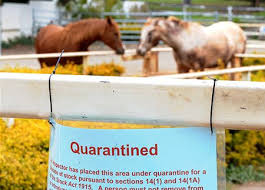By Jeremy Sollars
EQUINE Veterinarians Australia (EVA) says the latest hendra virus case near Casino which resulted in the death of a horse just before Christmas reveals unusual signs and aspects of the disease.
The Casino property has been quarantined since the death of the horse on Friday December 23.
The horse was being treated by a vet before its death and samples were then sent to the NSW Department of Primary Industries for testing. The lab then confirmed the hendra virus.
Those who handled the horse are being monitored by NSW Health. It is understood the horse had been in a paddock with regular flying fox activity.
It was the first case of hendra virus in NSW in 2016.
EVA spokesman Dr Ben Poole said the case made dealing with hendra even more complicated and concerning.
“The facts of the case would suggest the horse may have initially received a low infectious dose of the virus that eventually led to the horse succumbing to the disease, after an unusually protracted illness,” Dr Poole said.
“What’s different about this case is that the horse initially tested negative for hendra virus after losing weight for two weeks and presenting with a sore mouth.
“It was given medication and the horse started recuperating while in quarantine on the farm.
“A week later the horse deteriorated rapidly and died a few days later. A nasal swab taken from the carcass a week after the horse died returned a positive test for hendra virus. Further testing of tissue samples indicated that the horse had mounted an immune response to the virus.”
Dr Poole said this demonstrated the difficulty of making an initial diagnosis of hendra virus infection, and highlighted the risk that hendra virus posed to anyone including horse owners, vets and those who came into contact with horses displaying vague signs of illness.
“That’s why vaccination of horses against hendra virus is important for managing the risks involved with the disease,” he said.
“The summer timing of this case in the Northern Rivers is unusual and is probably due to food shortages and environmental stress on the bats in the area – so it’s really important to be vigilant all year round.”
Horse owners should contact their local veterinarian for more information about the hendra virus vaccination.
For more information: www.dpi.nsw.gov.au/about-us/media-centre/releases/2016/hendra-virus-confirmed-near-casino







